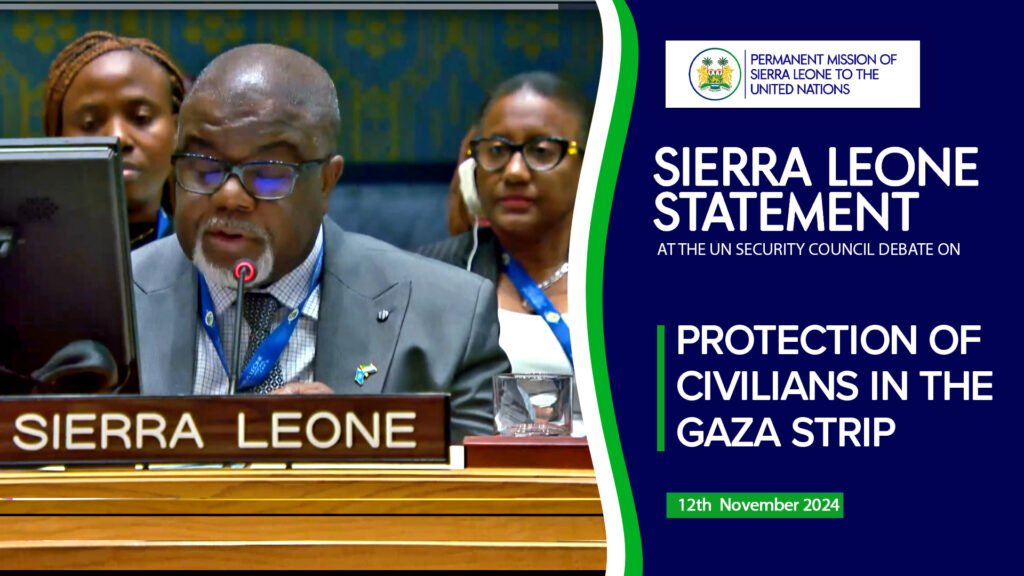BY
H.E. MR. AMARA S. M. SOWA
AMBASSADOR & DEPUTY PERMANENT REPRESENTATIVE
Thank you, Mr. President.
I thank Assistant Secretary General for Human Rights Ms. Ilze Brands Kehris, Acting Under-Secretary General for Humanitarian Affairs and Emergency Relief Coordinator Ms. Joyce Msuya and the Director, Office of Emergencies and Resilience, Food and Agriculture Organization, Mr Rein Paulsen, Food and Agriculture Organization; for their briefings.
We welcome the participation of Israel, Lebanon and the Observer State of Palestine to this meeting.
Civilians have borne the brunt of the war in the Gaza Strip, with at least 43,000 people killed, over 100, 000 injured and nearly 1.9 million displaced, many of them repeatedly. Civilians have had their homes, schools, markets, and all semblance of normal socio-economic life destroyed, and virtually live in perpetual fear and constant deprivation.
In the absence of a ceasefire the men, women and children caught up in this conflict have no safe refuge. International humanitarian law, including the rules of distinction, proportionality and precaution is being repeatedly challenged with no exception, no protection and no respect for the rights and dignity of persons.
The resolutions adopted by this Council since the onset of this cycle of conflict in October 2023 have all been aimed at preventing the devastating humanitarian impact of war. It is unfortunate that the fears that propelled the Security Council to adopt Resolution 2417 in 2018, that armed conflicts and violence have devastating humanitarian consequences, often hindering an effective humanitarian response and are a major cause of the risk of famine, are tragically unfolding in the Gaza Strip where the food systems have collapsed and humanitarian aid flows are at their lowest levels.
Previous and current reports from United Nations humanitarian personnel and other partners emphasize the grim reality of death and suffering in the Gaza Strip, with October reportedly recording the lowest number of aid trucks entering Gaza since November 2023, at 58 per day. This is a sharp decline from the approximately 200 aid trucks per day recorded in August 2024. Northern Gaza remains particularly at risk, with reports indicating that it is almost impossible to deliver food aid and supplies to its approximately 75,000 to 90,000 estimated residents.
We are particularly concerned with the recent Integrated Food Security Phase Classification (IPC) alert of 8th November 2024, that “an imminent and substantial likelihood of famine is occurring in the Gaza Strip, due to the rapidly deteriorating situation”. The IPC report has classified the entire Gaza Strip as an IPC Phase 4 (emergency) acute food insecurity, with IPC phase 3 (serious) levels of acute malnutrition in September to October 2024. The non-availability of food due to the halt of agricultural and economic activity, as well as access constraints, mainly caused by insecurity, blockades and other administrative/operational restrictions, has caused the IPC Famine Review Committee to conclude that “starvation, malnutrition and excess mortality due to malnutrition and disease, are rapidly increasing in the Gaza Strip, especially the North.” This assessment echoes the statement issued by heads of 15 UN and humanitarian organizations, including Ag. USG Msuya, at the start of this month, that “the entire Palestinian population in North Gaza is at imminent risk of dying from disease, famine and violence.”
President,
Current happenings in the Gaza Strip violate all Security Council resolutions, including resolutions 2417(2018), 2573(2021) and 2730(2024) that strongly call for the respect and protection of the civilian population, including humanitarian personnel and civilian objects.
In this connection, we are thus deeply concerned that Qatar will pause mediation efforts for a Gaza ceasefire and hostage release deal until Hamas and Israel show a “sincere willingness” to return to the negotiating table. We therefore urge Israel and Hamas to demonstrate good faith and sincere willingness to recommit to the negotiations in order to agree to a ceasefire to alleviate the suffering of the Palestinian people.
In seeking an end to this tragedy that is worsening day by day, Sierra Leone will thus engage and call for following actions:
First, we join the 15 UN and humanitarian organizations of the Inter-Agency Standing Committee (IASC)to reiterate their appeal for parties to the conflict to protect all civilians in the Gaza Strip as stipulated in resolutions 2417, 2573 and 2730.
Second, we reiterate our call for the full respect of international humanitarian law, that will allow for the unimpeded supply of food, water, medical and other essential items to enter the Gaza Strip without further delay.
Thirdly, we emphasize the indispensable role of UNRWA, acknowledging the reliance of the entire humanitarian community on its extensive capacities and comparative advantages in providing daily aid and supporting accelerated aid delivery to millions of Palestinians in the region. We therefore call on the State of Israel to reconsider its recent legislation and desist from actions that may impact the operations of UNRWA in the Occupied Palestinian Territory.
Lastly, Sierra Leone reiterates its support for any effort or initiative by this Council that will demand an immediate ceasefire, the release of all the remaining hostages and the full implementation of all the resolutions adopted on this question since the 7th October 2023. Let us treat this subject with the urgency required to save lives and rescue succeeding generations from the scourge of war.
I thank you.



